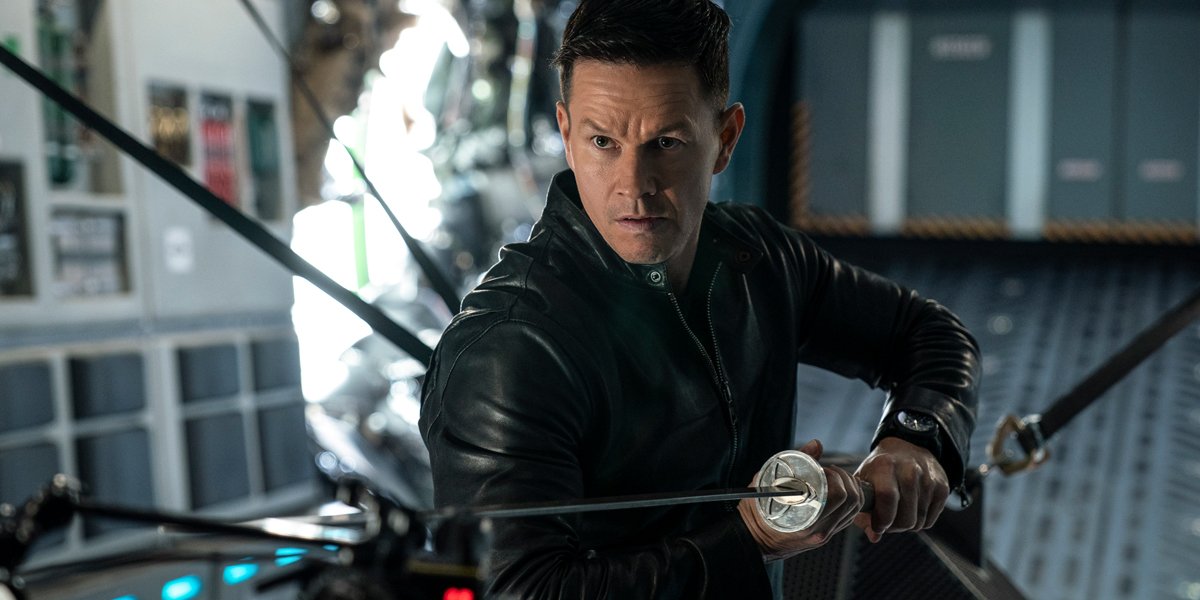Antoine Fuqua’s Infinite doesn’t waste any time telling the audience exactly what kind of movie it is, and in doing so it throws up some major red flags. In the run-up to its opening action sequence, a Mark Wahlberg voice over plays that unleashes a big fat exposition dump on the audience – blatantly explaining to the audience the core sci-fi idea at the center of the plot. It’s not only an immediate warning that this is a production that is willing to cut corners in its storytelling, but it also screams that the blatant explanation was deemed necessary because the rest of the film fails to communicate its ideas coherently. As it turns out, both are true… and those are just two of many issues that make themselves apparent throughout, ranging from misguided to straight-up bad.
While it can be said that there are some exciting action beats to be found in the movie, the vast majority of it is over-the-top nonsense that borders on the ridiculous, all without ever demonstrating a sense of humor. It clearly has big franchise aspirations and it makes a go for being weird, but it coalesces as a convoluted and tired “chosen one” story that inspires an empty performance from Mark Wahlberg and some world-class scenery chewing from Chiwetel Ejiofor.
Infinite has the vibe of a bad comic book from the 1990s, but it’s actually loosely based on the novel The Reincarnationist Papers by D. Eric Maikranz – adapted by Ian Shorr and Todd Stein. Fitting the aforementioned “chosen one” trope to perfection, Evan McCauley (Mark Wahlberg) is a down-and-out man who can’t get a job and is struggling to make ends meet – but then one day a beautiful woman (Sophie Cookson) arrives in a bulletproof car and informs him that he has a tremendous legacy of past lives and that he is essentially destined to save the world.
As is spelled out in the opening minutes by the voice-over narration, there are certain people on the planet who are known as Infinites: souls who have been reincarnated multiple times and can remember events from their past lives. It’s not a peaceful collective, however, as they are split into factions. The Believers try and use their ability for good and the benefit of humanity; while the Nihilists view it as a curse, and use that as motivation to try and end the world so that they can stop the endless cycle of their lives.
The tool for accomplishing the destruction of mankind, an egg, was hidden by Evan in a past life, and the Believers need him to help them find it before the leader of the Nihilists, Bathurst (Chiwetel Ejiofor), can find it first.
Infinite’s plot is bloated with details, but thin on actual substance.
If I were to tell you that the Nihilists possess technology-enhanced weapons that allow souls to be captured as digital data, stopping the reincarnation process, would you agree that the entire plot is rendered meaningless? It’s not a great thing when the entire plot of a movie can easily be solved by with the suggestion that the villain just kill himself with a magic bullet – but that’s but one of the many delicate threads that Infinite doesn’t want you to pull or think about too hard as you digest its story.
A shocking percentage of the movie is taken up by Evan being shown varieties of shiny, meaningless gadgets while remaining incredulous about the new world into which he’s been thrown, and Bathurst dramatically bemoaning his torturous existence. And it all just comes across as showy rubbish to inflate an overcomplicated and cliché-ridden narrative.
Your Daily Blend of Entertainment News
Chiwetel Ejiofor delivers too much while Mark Walhberg doesn’t deliver enough.
It was around this time last year that Chiwetel Ejiofor starred as an antagonist in another film with its own spin on the concept of immortality, but while Gina Prince-Bythewood’s The Old Guard saw him play a nuanced character trapped in circumstance by his fascination with everlasting life, he is at a permanent 12 out of 10 in Infinite, and it’s not a good look. By the time it gets to a scene where Bathurst is shown willingly getting waterboarded as some kind of ceremony, you can’t help but be reminded of Eddie Redmayne’s notorious turn in Jupiter Ascending and wonder why nobody on set was questioning some of the choices being made.
At the very least one person who benefits is Mark Wahlberg. The star delivers a performance featuring none of the charisma he’s proven he’s capable of possessing, but at the very least one can’t describe his work as totally unhinged.
On some level you can admire the confidence that Infinite displays in its own coolness (there’s no other explanation for why it thinks it can get away with a final voice-over line like, “And next? Well, the possibilities are… infinite”), but that confidence is ultimately wholly unearned. If it at least had a sense of fun it would at least possess some entertainment value, but instead it’s just a messy slog that registers as a disappointing use of all the talent involved.

Eric Eisenberg is the Assistant Managing Editor at CinemaBlend. After graduating Boston University and earning a bachelor’s degree in journalism, he took a part-time job as a staff writer for CinemaBlend, and after six months was offered the opportunity to move to Los Angeles and take on a newly created West Coast Editor position. Over a decade later, he's continuing to advance his interests and expertise. In addition to conducting filmmaker interviews and contributing to the news and feature content of the site, Eric also oversees the Movie Reviews section, writes the the weekend box office report (published Sundays), and is the site's resident Stephen King expert. He has two King-related columns.

